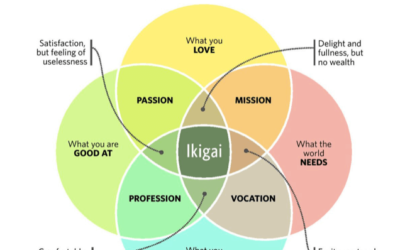I hope you are well. We have weathered a lot in the past nine months—from the loss of life to the disappearance of jobs and livelihoods. We have been called upon to use our powers of discipline, acceptance, and fortitude to withstand the restrictions that have been imposed on our lives. And we have adapted and soldiered on.
For many people the Pandemic has given them time to reflect about their lives, and to focus on what is really important to them.¹ I believe it has inspired a new reverence for the fragility of life.
With the transiency of life as a theme and as the New Year approaches, which is a time of new beginnings, I feel impelled to write about a subject that I feel has more primacy and urgency. I had promised to write about the Gut, Part 2. I will address the Gut in a subsequent Newsletter.
The focus of this Newsletter will be about “Ikigai” and how it can affect your health, well-being and ultimately your life.
Ikigai (pronounced “Ickee Guy”) is the Japanese term for one’s reason for being, or as they say in French, Raison d’être. Knowing one’s Ikigai can help us embrace life more fully.
In their book, Ikigai: The Japanese Secret to a Long and Happy Life, Hector Garcia and Francesc Miralles state that Ikigai may be one of the factors that contributes to Japanese longevity, especially the Centenarians who live in Okinawa. ⁽²⁾ ⁽³⁾
Research has shown that having meaning and purpose in life can increase psychological well-being. In fact, it “can aid in overcoming stress, depression, anxiety, and other psychological problems,” as well as cause a “decrease in mortality across all ages.” ⁴
Your Ikigai could be having meaning in your work, or volunteering, or caring for animals. Whatever it is that gives you meaning, value, and purpose will help you become a happier and healthier person.
FINDING YOUR IKIGAI
How can we find our Ikigai to have a more profound and joyous life experience, which will ultimately make the world a better place?
Try this exercise—Get a piece of paper and a pen or pencil:
Answer these questions:
What do I love to do?
What am I good at?
And for people in the work force looking for more meaning, answer these additional questions:
What does the world need?
What can I get paid for?
image
The intersection of the answers is your Ikigai.
Please See the Graphic below.
As the New Year approaches, reflect about your Ikigai. Here are 5 things to help you find your reason for being:
- Slow Down and Go “Inside.”
- Savor — food, people, experiences.
- Pay Attention to what you are doing while you are doing it. Notice what makes you feel good.
- Have Gratitude — Feel in your body and essence how gratitude makes you feel.
- Have Self-Compassion — if you can’t find your Ikigai right away, that’s ok. Continue to observe what makes you happy and what you love to do.
“The best day of your life is the one on which you decide your life is your own. No apologies or excuses. No one to lean on, rely on, or blame. The gift is yours – it is an amazing journey – and you alone are responsible for the quality of it. This is the day your life really begins.”
—Bob Moawad ⁽⁴⁾
I hope you have enjoyed this month’s Newsletter. I wish you and yours a beautiful New Year filled with health, love, joy, abundance, and peace! And I hope you find your Ikigai!!
With love,
Dr. Jill
Sign Up For My Newsletter
References:
https://kinder.rice.edu/urbanedge/2020/04/29/pandemic-lessons-silver-linings-day-care
García, Héctor, Francesc Miralles, and Heather Cleary. Ikigai: The Japanese Secret to a Long and Happy Life. New York: Penguin Books, 2017.
https://medium.com/thrive-global/ikigai-the-japanese-secret-to-a-long-and-happy-life-might-just-help-you-live-a-more-fulfilling-9871d01992b7
Schippers MC, Ziegler N. Life Crafting as a Way to Find Purpose and Meaning in Life. Front Psychol. 2019 Dec 13;10:2778. doi: 10.3389/fpsyg.2019.02778. PMID: 31920827; PMCID: PMC6923189
Other Resources:
https://greatergood.berkeley.edu/article/item/living_with_a_purpose_changes_everything#:~:text=According%20to%20a%20new%20book,our%20health%20and%20well%2Dbeing.&text=For%20example%2C%20studies%20have%20found,over%20a%20two%2Dyear%20period.
Trudel-Fitzgerald, C., Millstein, R.A., von Hippel, C. et al. Psychological well-being as part of the public health debate? Insight into dimensions, interventions, and policy. BMC Public Health 19, 1712 (2019). https://doi.org/10.1186/s12889-019-8029-x
https://www.bostonglobe.com/2020/07/05/nation/if-i-die-now-have-i-lived-life-i-wanted/
Disclaimer: Please note that the content on this newsletter does not constitute medical advice. Please consult with a physician before making any medical or lifestyle changes.

